ApexSQL Refactor FAQ
General
For a list of general FAQs about ApexSQL add-ins, please see ApexSQL add-ins general FAQs
SQL Server Management Studio and Visual Studio support
Yes, ApexSQL Refactor integrates into Visual Studio 2010 and higher
Microsoft SQL Server 2005 and higher
SQL Server Express, Standard, and Enterprise editions
Yes. ApexSQL Refactor supports Azure SQL Database and SQL Server on Amazon RDS
Yes, ApexSQL Refactor supports Azure SQL Database Managed Instance
Microsoft SQL Server Management Studio 2012 and higher
You can use the
latest full-featured backwards compatible SQL Server Management Studio for
free. Click here
Yes, ApexSQL Refactor supports Active Directory - Password authentication
SQL formatter customization
Yes, you can customize the SQL code layout with nearly 200 different SQL
formatter options.
Please visit the following article: How
to customize SQL formatting profiles
Yes, you can have many different users defined SQL query formatter profiles
Yes. You can easily export and share all the SQL formatter options
Batch SQL formatter
Yes, ApexSQL Refactor provides the Format SQL objects feature for such a task
Yes, the Format SQL scripts feature can be used for formatting multiple SQL scripts at once
Yes, you can specify the list of script-based objects, for example stored procedures and functions that want to format
Yes, the last column, "OK" under the Format SQL object window indicates whether the object is formatted properly, according to the specified format profile. A red X denotes that the object isn't formatted properly. A check mark, indicates the object is formatted properly. All objects that require formatting, will be pre-selected
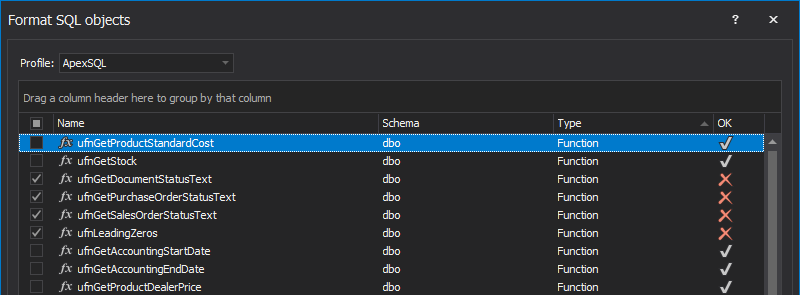
Yes, before executing the batch SQL query formatter, you can compare a SQL
object's script as it now and how it will look like after clicking ‘OK'
to format SQL.
Right click on the script object from the list in the
Format SQL object window and click the Compare button or use
the Ctrl + G shortcut:
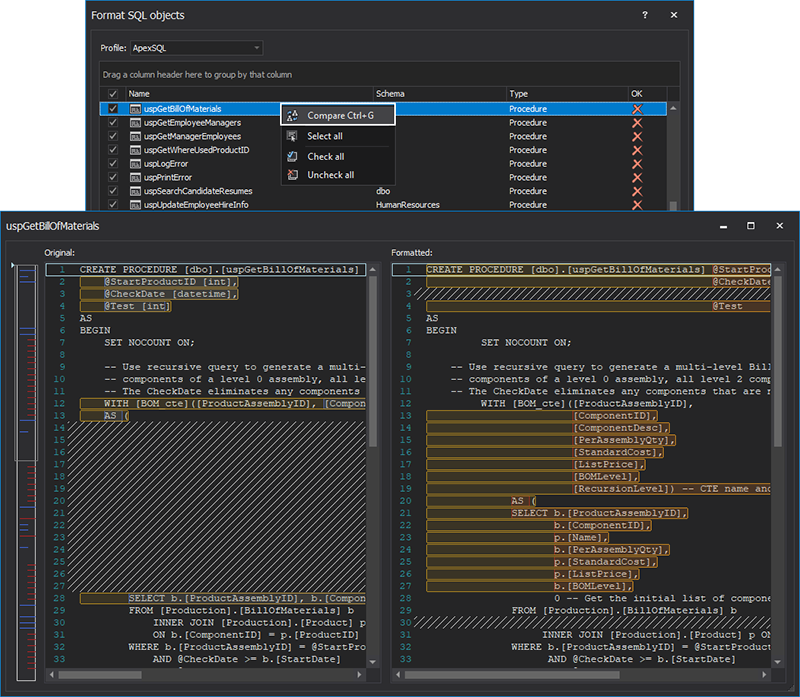
Currently, no. This feature is planned for ApexSQL Refactor 2019 R2
Currently, no. This feature is planned for ApexSQL Refactor 2019
Formatting other
Yes, SQL code can be obfuscated and make less readable
There are options for Wrapping, randomize keywords case and remove comments. All options are located under the Obfuscation tab of the Options dialog:

Yes, ApexSQL Refactor has SQL code formatting impact preview which shows a clear insight and view of the impact of any formatting option changes immediately when you make them. If you don't like how it looks it can be easily changes and reverted without saving:
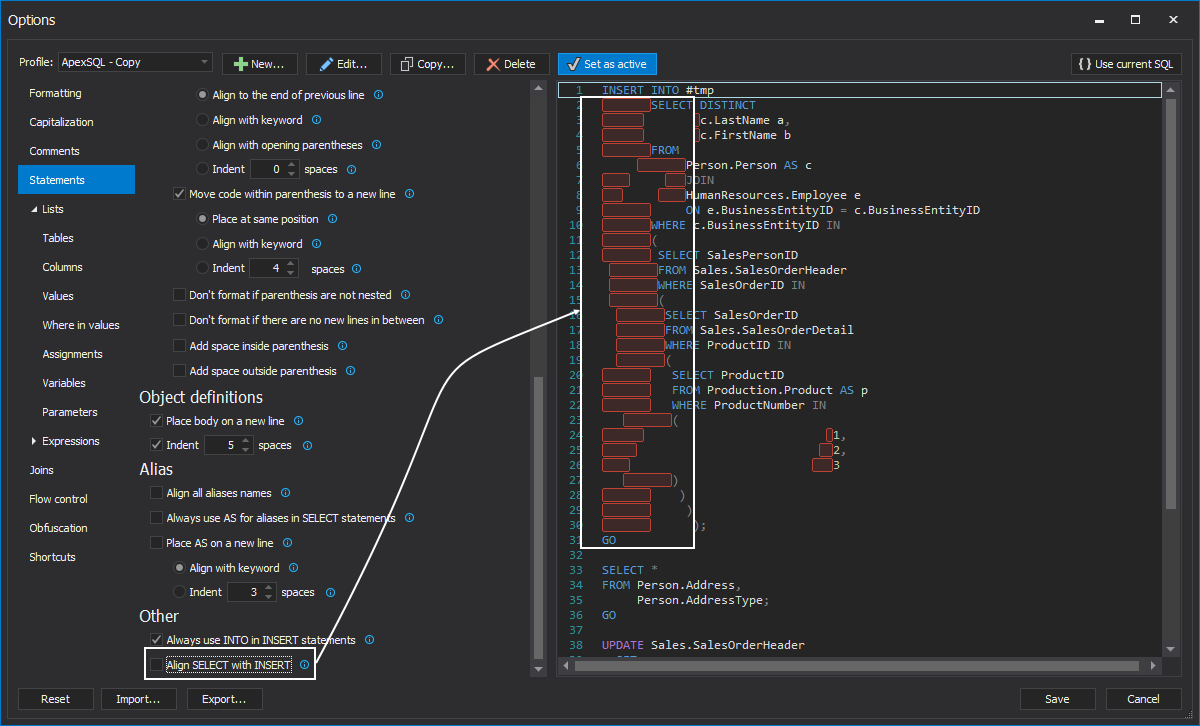
By default, the predefined SQL code is used, but you can use SQL code that is in a SQL editor by clicking the Use current SQL button on the top right side of the Options dialog and preview changes:
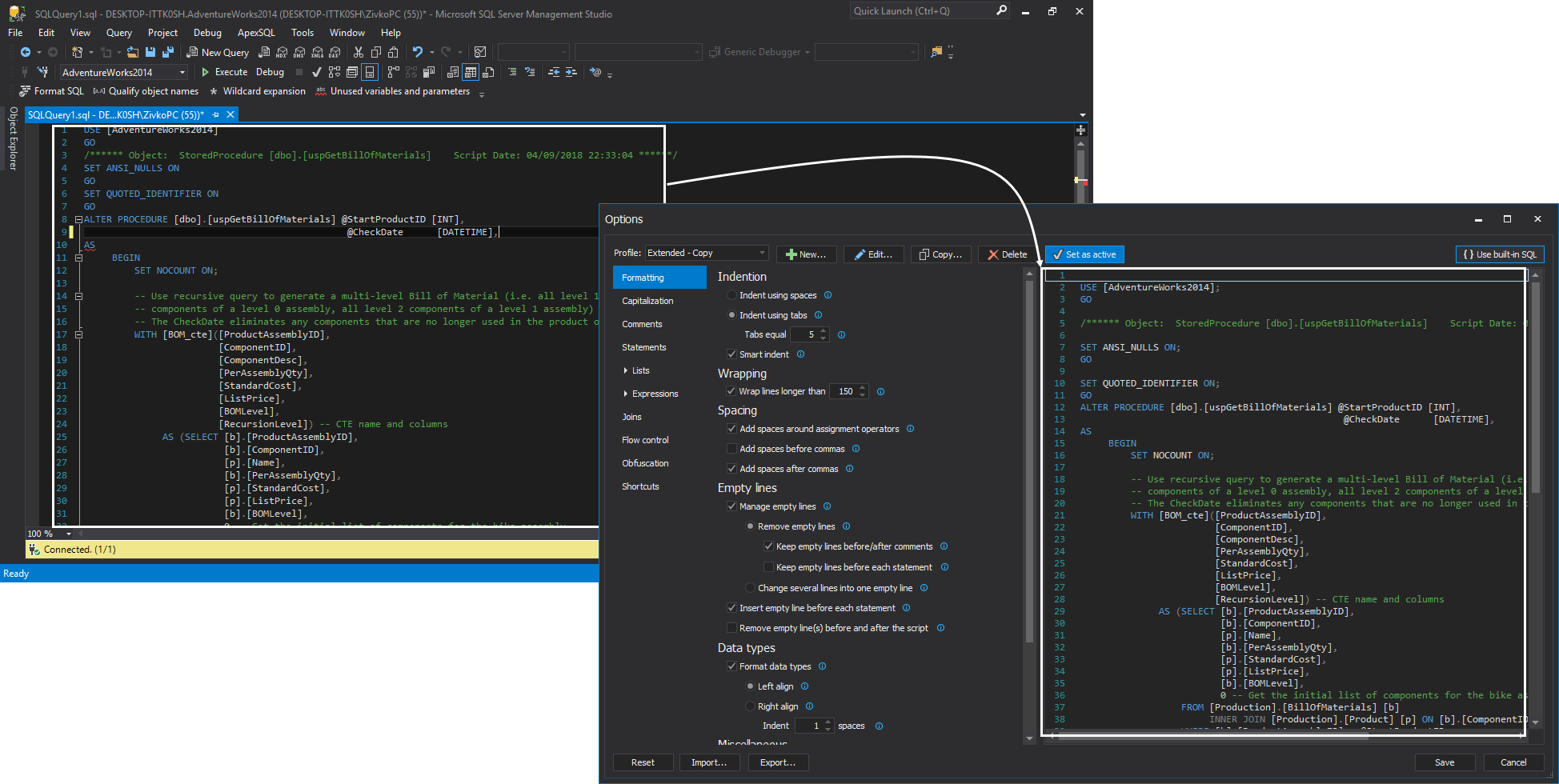
Yes, if in a SQL script wants to format only one part of the script and other parts to be non-formatted, just select that part and use Format SQL command either from the ApexSQL Refactor toolbar, ApexSQL Refactor main menu or right click in a query editor and from the context menu, choose command to format SQL code:
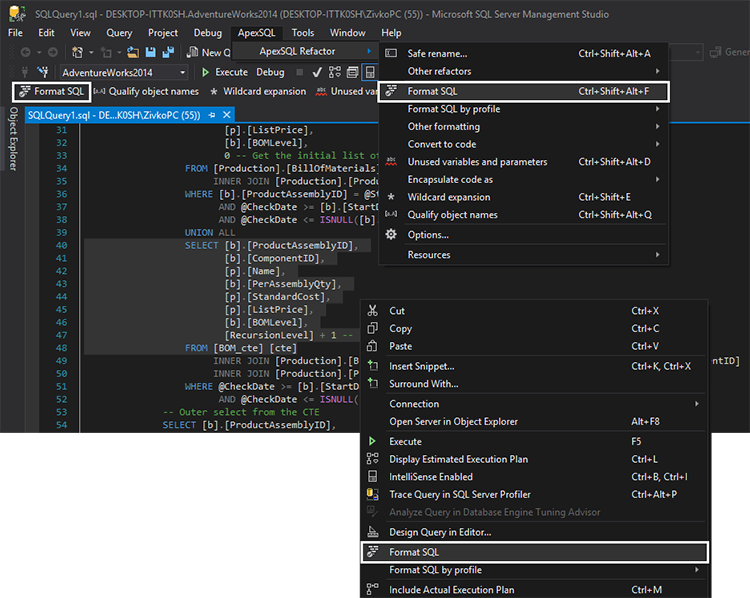
Yes, you can use ApexSQL Refactor formatting options under the Capitalization tab of the Options dialog to change the case of keywords, built-in functions, built-in data types, identifiers and variables

Yes, using the Wildcard expansion feature from ApexSQL Refactor you can expand SELECT * statements so that they list all of the columns that exist in the referenced tables. Doing this you can improve query performance and avoid syntax errors
Yes, by using the Qualify object names feature to qualify the object. When the object in a SQL query is qualified SQL Server will not check if the current user is the owner of the object when executing a SQL query, meaning that no additional work will be required from SQL Server. This speed up the query execution
Refactoring
Yes, you can rename tables, procedures, views, functions, parameters and
columns without breaking any dependencies.
Please visit the following
article: How
to rename database objects in a SQL Server database safely
Yes, the tool can add and remove parameters as well as change their names,
default values and data types without impacting referencing objects.
Please
visit the following article: Changing
SQL stored procedures and functions parameters without breaking dependencies
Yes, using Encapsulate code as feature you can creating a new stored procedure, a view, a scalar inline function, or a table inline function from any valid T-SQL code block.
Yes, ApexSQL Refactor can split a table in your database into two tables. This is useful when wants to normalize your database or improve database performance
Please visit the following article: How to set options for the Split table refactoring method on SQL Server
Yes, for that in ApexSQL Refactor exist Add surrogate key feature, which can replace a complex natural key with a simple surrogate key thus keeping referential integrity, unifying key support for the whole database, and improving database refactoring performance
Other
Yes, using the Unused variables and parameters feature from ApexSQL Refactor you can clean up your code by identifying and removing parameters and variables that aren't used
Yes, you can convert a T-SQL script into client language-specific syntax -
Java, VB.NET, c#, Perl, PHP, Delphi, Ruby, C++, or other custom languages for
which conversion rules are defined.
Please visit the following article:
How
to quickly convert SQL code to language-specific client code
No, ApexSQL Refactor is not open source software
